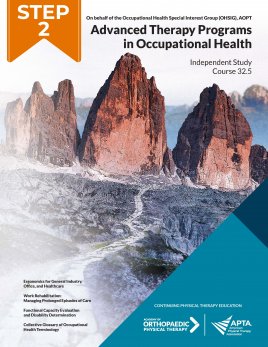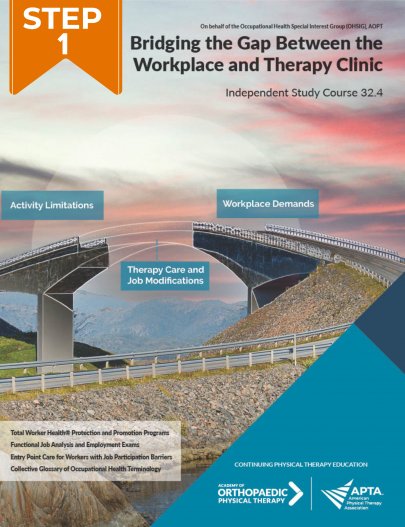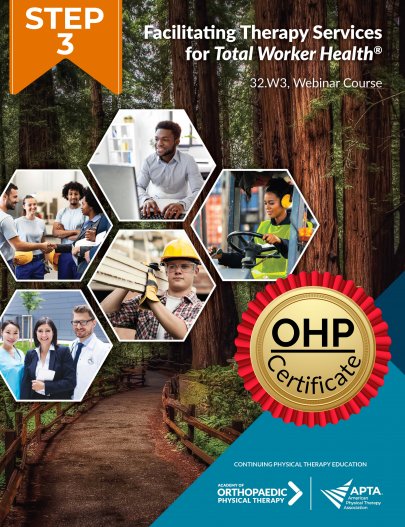
Advanced Therapy Programs in Occupational Health
| Online Only | Online + Hard Copy | |
|---|---|---|
| APTA Orthopedics Member | $155 | $190 |
| Non-APTA Orthopedics Member | $305 | $340 |
Related Courses
Cancellation Policy / Refund Policy
Due to the automation of our learning management system allowing you instant access to the online content and the immediate order placement for a plus print product, there are no refunds after an order is placed.
Course Description
This is the 2nd in a series of 3 courses included in the Occupational Health Practitioner certificate program that is managed by the Occupational Health Special Interest Group (OHSIG) of the Academy of Orthopaedic Physical Therapy, APTA. It expands on essential content provided in the 1st course, Bridging the Gap Between the Workplace and Clinic, to address best practices in advanced therapy programs in occupational health.
The first monograph emphasizes the elements of a comprehensive ergonomics program and best practices for implementing job interventions to support injury prevention or worker accommodation. Ergonomics interventions are applied to 3 common areas of ergonomic practice: industrial ergonomics/manual material handling, healthcare ergonomics, and computer/office ergonomics. The second monograph emphasizes evidence-based, worker-centered, and clinically relevant strategies to implement advanced work rehabilitation programs for individuals experiencing prolonged episodes of care precluding return to work.
Finally, the third monograph provides in-depth instruction on how to administer a functional capacity evaluation to establish cause and nature of an individual’s injuries, symptoms, biopsychosocial factors, impairments, activity limitations, participation restrictions, return to work barriers, and facilitators. This includes recommendations for selection of functional performance tests, assessment of performance validity, and interpretation/reporting of information to promote greater fairness and objectivity in disability determination. Finally, each monograph concludes with 3 or 4 applied case scenarios to demonstrate delivery of advanced occupational health programs to prevent needless work disability or expedite functional recovery of injured workers.
Total Worker Health® is a registered trademark of the U.S. Department of Health and Human Services (HHS). Use of this mark by the Academy of Orthopaedic Physical Therapy, APTA, Inc. does not imply endorsement by HHS, the Centers for Disease Control and Prevention, or the National Institute for Occupational Safety and Health.
Course Overview
Course Format: Online with an option to purchase the print version
Contact Hours: 15 contact hours
State Approval: APTA Orthopedics courses are accepted in all states plus the District of Columbia, as allowed by the type of course requirements in state regulations. A small number of states require APTA to seek pre-approval of courses. The approval codes for these states can be found here. Always check with your State Licensing Board to confirm contact hours offered.
View Full State Approval InformationCourse Objectives
- Identify occupational and non-occupational risk factors for musculoskeletal disorders and understand how they impact the workplace.
- Understand and describe types of ergonomics evaluations.
- Recognize key elements of effective ergonomics programs including appropriate outcome measures resulting from effective interventions.
- Identify appropriate candidates for comprehensive work rehabilitation programs beyond entry point care.
- Describe the components of a comprehensive evaluation for a worker experiencing a prolonged episode of care.
- Design an individualized comprehensive work rehabilitation program that aligns with worker needs and balances system demands.
- Consider performance validity factors used in determining an individual’s safe functional capacity and functional limitations.
- Describe the process for differential diagnosis to assess the causal relationships between health conditions, physical impairments, and resulting functional limitations.
- Compare the physical capacities of a worker to the physical demands of a job.
Topics and Authors
- Ergonomics for General Industry, Office, and Healthcare
Leslie Pickett, PT, DPT, CPE; Joanette Lima Nativo, PT, MS, CPE; Brian Lowe, PhD, CPE; Aresio Souza, PT, MS, CIE - Work Rehabilitation: Managing Prolonged Episodes of Care
Katie P. McBee, PT, DPT, MS, OCS; Colleen Medlin, PT, DPT; Brocha Z. Stern, PhD, OTR, CHT; Sarah Martin, OTR/L - Functional Capacity Evaluation and Disability Determination
Wayne MacMasters, PT, DPT; Steve Allison, PT, DPT, CME; Rick Wickstrom, PT, DPT, CPE, CME; Peter McMenamin, PT, DPT, MS - Collective Glossary of Occupational Health Terminology
Rick Wickstrom, PT, DPT, CPE, CME; Steve Allison, PT, DPT, CME
Customers Frequently Viewed
Add To Cart
Which version of the course would you like to purchase?
Members Only
You need to be a member to buy this course.
Join today to enjoy exclusive deals and prices on all courses.
Join Now

